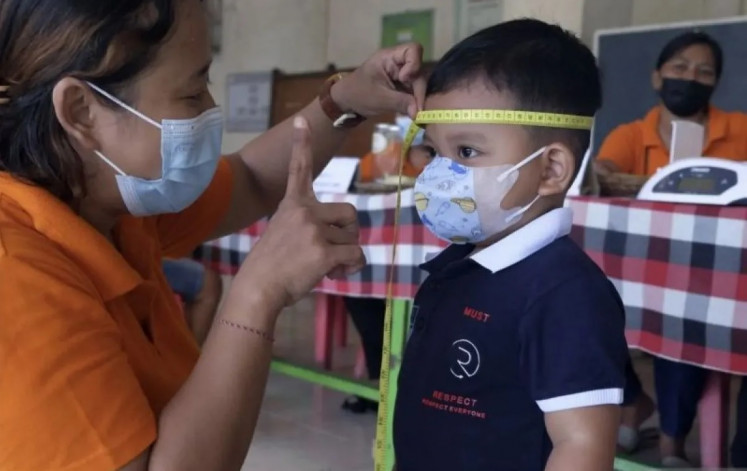RI tables ban on maids to Malaysia
Indonesia is looking into revisiting a moratorium on sending its domestic workers to Malaysia, officials have said, sparked by a recent case of ill treatment that led to the death of an Indonesian maid who had allegedly been recruited illegally for work in the neighboring country
Change text size
Gift Premium Articles
to Anyone

I
ndonesia is looking into revisiting a moratorium on sending its domestic workers to Malaysia, officials have said, sparked by a recent case of ill treatment that led to the death of an Indonesian maid who had allegedly been recruited illegally for work in the neighboring country.
The death of 21-year-old Adelina Lisao in Penang, Malaysia, last week renewed a national debate on the need to strengthen protection for migrant workers and raised questions about the need to send Indonesians to a country whose porous borders are part of a region-wide human trafficking route.
President Joko “Jokowi” Widodo is on board with the idea of halting the recruitment of Indonesian domestic workers to Malaysia, having raised the issue during an annual consultation meeting hosted by Prime Minister Najib Razak in Kuching last year, Indonesian Ambassador to Malaysia Rusdi Kirana revealed recently.
Rusdi said he had proposed halting the sending of domestic workers to Malaysia and working on restructuring the employment administration process, with the aim of mending diplomatic ties between the two countries, which had been strained by repeated cases involving migrant workers.
His proposal comes on the heels of the case of Adelina, who had allegedly been forced to sleep outside the house with her employer’s dog for a month. She died with severe injuries to her head and face, and had infected wounds on her hands and legs.
“A moratorium is important so we can restructure our TKI [migrant workers] employment system to prevent cases such as Adelina’s from happening again,” Rusdi said, referring to migrant workers in the
informal sector.
He said violations against Indonesian domestic helpers had caused tension between the two countries. “In order to promote cooperation, what happened to Adelina should not happen again,” the envoy told reporters in Jakarta on Thursday.
Rusdi, who is also the owner of Indonesia’s largest low-cost carrier Lion Air Group, has said he had talked to the President about a possible moratorium last year.
“The president also wanted a moratorium, because he had also conveyed this to the Malaysian Prime Minister in the [November] meeting,” he said.
If Indonesia stopped sending domestic workers to Malaysia, Rusdi argued, the government would be able to improve the current employment mechanism, such as by introducing a minimum income requirement for potential employers that shows they are capable of paying wages.
Separately, the Manpower Ministry’s director for Indonesian migrant worker placement and protection, R. Soes Hindharno, said the proposal for a moratorium had not been discussed formally at the ministerial level.
He explained, however, that from a technical perspective, as stipulated in article 31 of Law No. 18/2017 on the protection of Indonesian migrant workers, a placement country may only receive Indonesian workers if it has signed a memorandum of understanding (MoU) to safeguard the well-being of Indonesian workers.
“The MoU with Malaysia expired in 2016 and it has not been renewed since,” Soes told The Jakarta Post over the phone
on Friday.
In 2011, Indonesia lifted a two-year moratorium when the agreement went into effect.
Before the MoU expired, Soes said, the two countries had established a joint task force team that had met 11 times discussing minimum wage, number of days off, overtime compensation, communication access and other workers rights. The last meeting took place in 2014.
Following the expiration of the agreement, the Manpower Ministry and the Foreign Ministry had proposed to renew the agreement to Malaysia, but to no avail. The Foreign Ministry’s overseas citizen protection director, Lalu Muhammad Iqbal, said there was no development over the renewal of the agreement.
Indonesia needed to leverage its position as Malaysia’s biggest labor supplier to restart negotiation. “We haven’t used it well,” Iqbal said.
According to Soes, Indonesia currently has 131 million people in its labor force, with 62 percent of them unable to find employment regardless of whether they graduated from junior high school or not. The reason was because most jobs in Indonesia required workers with a minimum of high school education.
In November last year, leaders of ASEAN countries signed an agreement on the protection and promotion of migrant workers’ rights in the region.
Migrant Care executive director Wahyu Susilo said a moratorium, if applied only unilaterally by Indonesia, would still risk human trafficking.
“The government must have a comprehensive plan, especially with Malaysia as the borders are not heavily guarded. Most workers are desperate, if they can manage to go to countries in the Middle East, what’s stopping them from going to Malaysia?” he said.
The Malaysian embassy did not respond to the Post’s inquiries for comment.









